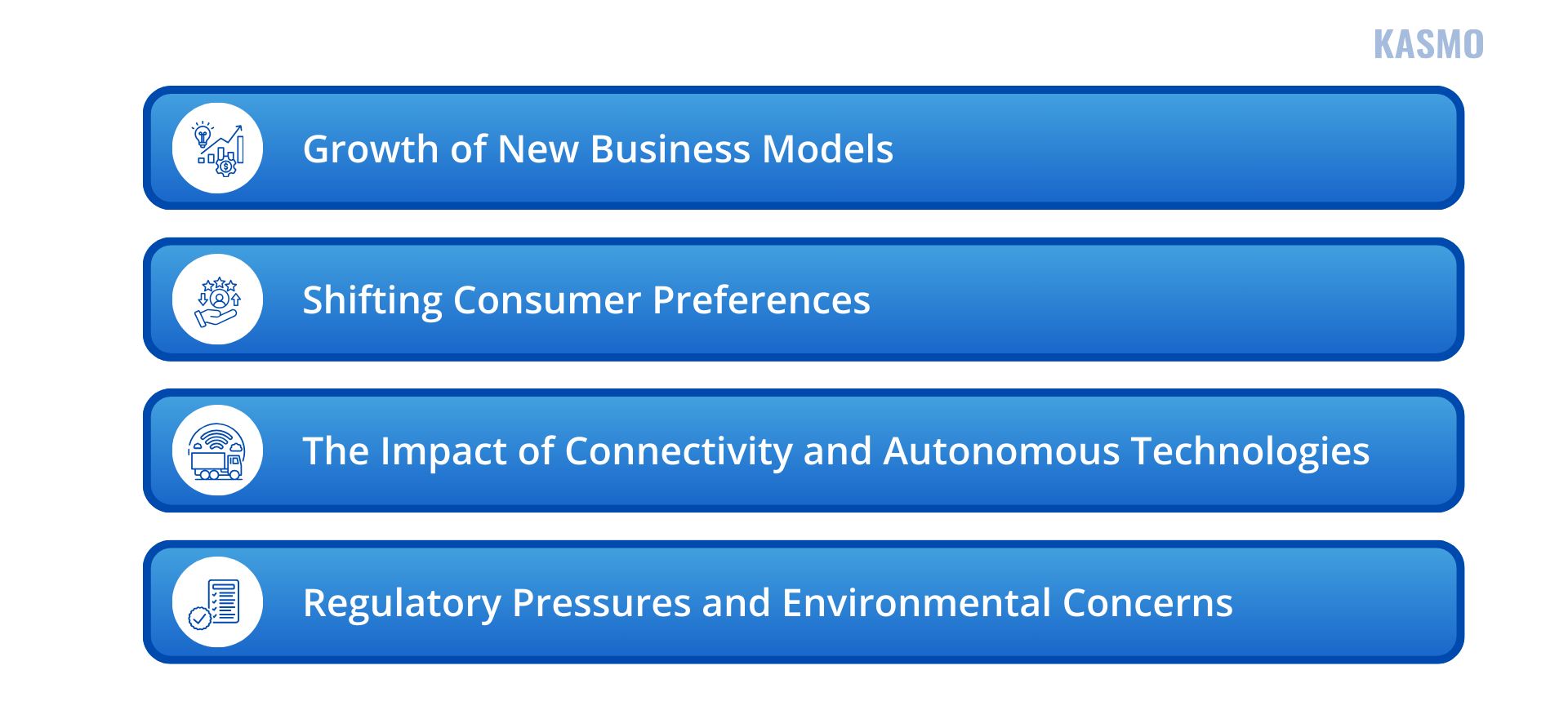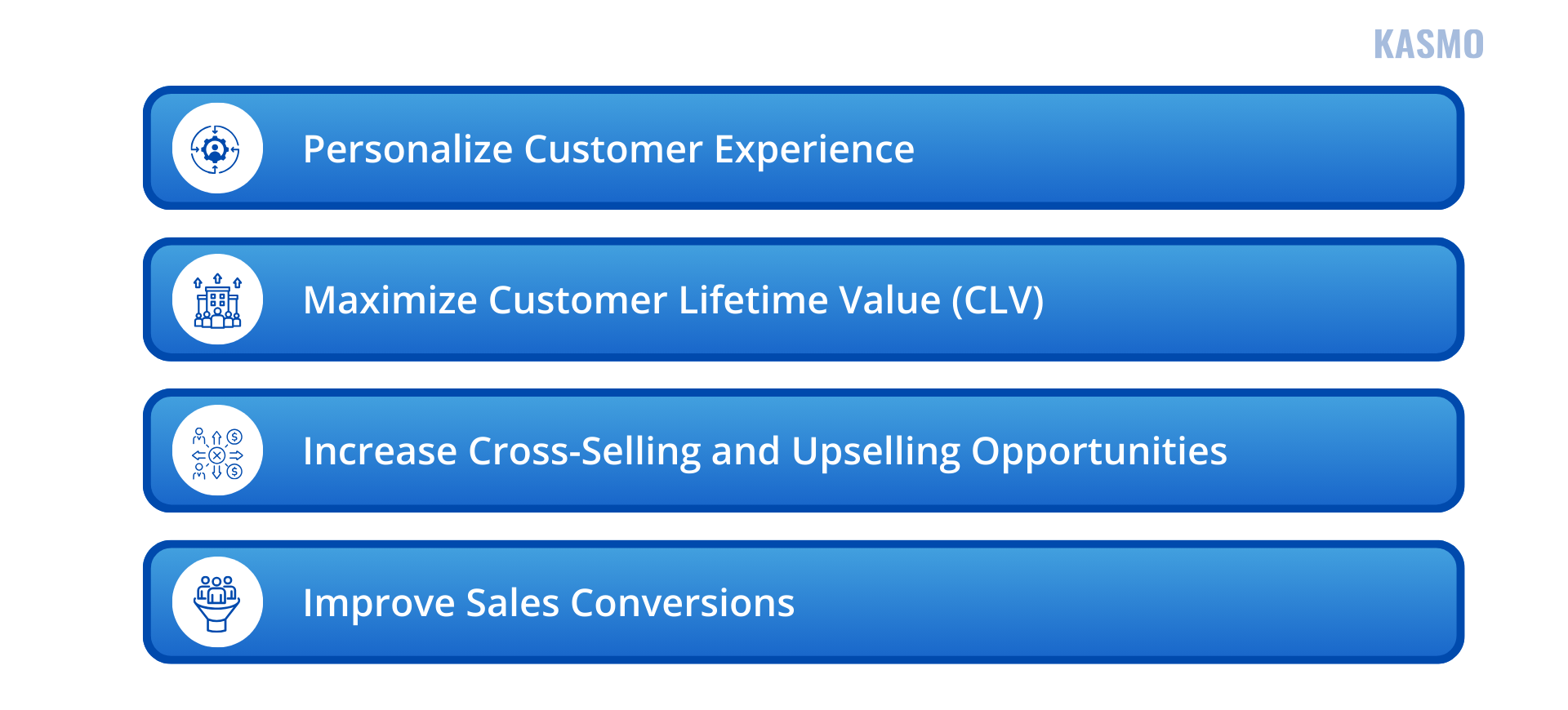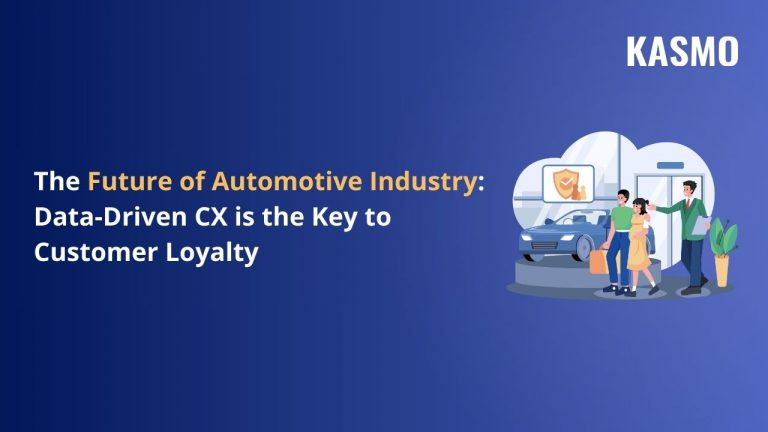Introduction
The automotive industry is rapidly moving towards the adoption of electric vehicles (EV) and autonomous vehicles. According to McKinsey, 62% of customers are changing their transportation habits due to sustainability concerns. With new and emerging technologies and trends, shifting consumer behaviors and the drive for more innovative business models, the future of automotive industry is rapidly changing. Additionally, providing a seamless, data-driven customer experience (CX) is crucial for automotive companies to meet new customer expectations, enhance loyalty, and stay competitive. In this blog, we explore how providing data-driven CX can transform the future of the automotive industry.
Trends in Automotive Industry to Follow in 2025
Due to increasing competition in the market, automotive businesses need to stand apart from their competitors. These trends will show you how:

Growth of New Business Models
According to McKinsey: “The automotive revenue pool will significantly increase and diversify toward on-demand mobility services and data-driven services. This could create up to $1.5 trillion—or 30 percent more—in additional revenue potential in 2030, compared with about $5.2 trillion from traditional car sales and aftermarket products/services, up by 50 percent from about $3.5 trillion in 2015”.
As connectivity and autonomous technology continue to advance, cars will increasingly transform into platforms that allow drivers and passengers to make the most of their time on the road. Whether by consuming new types of media and services or engaging in other personal activities, the time spent in transit will be more productive and enjoyable. Moreover, the rapid pace of innovation of technologies will require automotive companies to upgrade their vehicles. This will create new business models for automotive companies, which will allow them to attract more customers, accelerating their chances to increase revenue.
Shifting Consumer Preferences
Consumer preferences are increasingly changing. People now want the entire process of purchasing a vehicle to be digital and effortless. Increased awareness towards sustainability has also increased the demand for shared vehicles.
The Impact of Connectivity and Autonomous Technologies
Connectivity and autonomous vehicles are re-shaping the automotive industry. These autonomous vehicles are some excellent data sources through which companies can understand consumer behavior, driving patterns and areas where consumers want the companies to make driving more seamless.
With advancements in autonomous driving and the increasing availability of connected features, cars are no longer just modes of transportation; they have become platforms for entertainment, communication, and productivity. By leveraging the data collected from these autonomous vehicles, companies can easily tailor and personalize experiences for every customer.
Regulatory Pressures and Environmental Concerns
Governments around the world are imposing stricter regulations around emissions and safety standards. Customers are also aware of the severe implications of harmful gases and the importance of reducing their carbon footprint. They are moving towards companies who can provide them with sustainable options.
This push towards sustainability is driving the rapid adoption of EVs and autonomous driving technologies. The automotive industry must adapt to these changes by leveraging data to ensure compliance, improve operational efficiency, and deliver customer value.
How Data-Driven Customer Experience is Transforming the Future of Automotive Industry
The new technologies and trends in the automotive industry have created vast opportunities for companies to gather crucial customer data and create data-driven customer experiences.
As the automotive industry transforms, providing a data-driven customer experience becomes a key differentiator. Automotive companies can collect, analyze, and draw insights from these vast amounts of customer data to deliver personalized, seamless interactions. By providing a data-driven customer experience, automotive companies can:

Personalize Customer Experience
A fragmented view of the customer data can prevent automotive companies from providing a tailored and personalized experience for their consumers. However, unifying customer data helps companies get a unified view of their preferences and demands. By leveraging this consolidated data, automotive businesses can deliver a personalized experience at every stage of the customer journey.
By leveraging Salesforce Automotive CRM, businesses can get a 360-degree view of customer data, enabling account managers understand each customer’s needs and preferences and allowing them to proactively offer solutions—whether it’s maintenance reminders, personalized product recommendations, or post-sales services. With a unified customer profile, Salesforce helps businesses anticipate customer needs, simplify interactions, and enhance satisfaction.
Maximize Customer Lifetime Value (CLV)
Data can be used to maximize customer lifetime value (CLV) by delivering tailored, relevant messages at the right time to consumers. By analyzing customer data, which includes past purchases, service history, and preferences – automotive businesses can segment customers and send personalized messages that drive deeper engagement.
For instance, targeted communication strategies such as sending reminders for oil changes or offering tailored promotions based on customer preferences can significantly boost CLV. Brands that leverage customer insights to offer personalized and timely communications create meaningful connections with customers, increasing loyalty and driving repeat business.
Increase Cross-Selling and Upselling Opportunities
Data can also be used by companies to boost customer relationships and identify cross-selling and upselling opportunities. By analyzing purchase history, preferences, and evolving needs, automotive businesses can create loyalty programs and targeted discounts to encourage auto buyers to buy more.
For example, after analyzing customer data, automotive businesses can encourage customers who regularly use after-sales services to upgrade their vehicles or purchase additional services, such as extended warranties or premium maintenance packages. These data-driven loyalty programs enhance customer engagement while also increasing sales and revenue.
By leveraging Salesforce, automotive companies can automate cross-selling and upselling using customer insights to create personalized offers based on individual behavior, ensuring customers feel valued and understood.
Improve Sales Conversions
Most customers prefer to purchase vehicles online. According to research by Frost & Sullivan, online sales are expected to grow more than 6 million by 2025. By leveraging data, the process of selling an automobile can be significantly streamlined. Automotive companies can use customer data to better understand their needs and streamline the customer journey, resulting in faster sales conversions.
With the help of platforms like Salesforce Automotive CRM, automotive businesses can capture and consolidate customer data from multiple touchpoints. This unified data enables sales and marketing teams to tailor their communications and outreach efforts to the right customers at the right time. Lead nurturing campaigns can be personalized based on customer interests and behaviors, improving conversion rates and reducing the time it takes to close deals.
By automating the lead generation process with Salesforce, automotive businesses can empower their employees to shorten the sales cycle and increase the rate of sales conversions.
How Salesforce Automotive CRM Plays a Crucial Role in Transforming the Future of Automotive Industry
Salesforce Automotive CRM is designed to support a wide array of stakeholders within the automotive ecosystem, from original equipment manufacturers (OEMs) and dealers to fleet operators. It empowers businesses to forge stronger connections with their customers, streamline operations, and create new revenue streams. Here’s how Salesforce Automotive CRM is playing a crucial role in reshaping the future of automotive industry:
Revolutionizing Customer Experience with Personalization
Salesforce is transforming the automotive industry by enabling companies to deliver highly personalized experiences. Through its advanced AI-driven capabilities, Salesforce allows businesses to have a comprehensive 360-degree view of each customer. This means that at every touchpoint—whether it’s online, in a dealership, or in a service center—automotive companies can be informed of the customer’s preferences, purchase history, service needs, and their driving habits.
Enhancing Operational Efficiency with AI and Automation
The automotive industry is increasingly turning to AI to streamline operations and reduce costs. By leveraging Salesforce, automotive companies can automate customer service interactions, marketing campaigns, sales processes and even improve inventory management.
Agentforce helps businesses make data-driven decisions by analyzing customer data and using AI-powered insights to forecast demand for certain vehicle models – helping them optimize their inventory and prevent overstocking. Additionally, AI Agents can automate workflows, which eliminates manual tasks and empowers employees to focus on high-value activities like engaging with customers or troubleshooting more complex issues.
This boosts efficiency and enhances the customer experience. Automated follow-ups, service reminders, and personalized offers ensure that customers feel valued at every stage of their journey, leading to higher retention rates and increased sales.
Empowers Automotive Retailers and Dealers
Dealers play a crucial role in the automotive industry and Salesforce helps them maximize their potential by providing them with a unified view of their customers, vehicles, and sales data. By integrating the CRM platform with dealer management systems, sales teams can easily track customer interactions, manage inventory, and ensure that they are always offering the right vehicle to the right customer at the right time.
Moreover, Salesforce enables seamless communication between dealers, OEMs, and service providers, fostering seamless collaboration and enabling a more efficient supply chain. This integration allows dealers to provide a more cohesive and personalized experience for customers, whether they are shopping for a new vehicle, getting service, or exploring financing options.
Conclusion
The automotive industry is undergoing a dramatic shift, with data-driven customer experience (CX) at the heart of this transformation. By leveraging data, automotive businesses can enhance customer satisfaction, improve loyalty, and drive innovation in an increasingly competitive market. Salesforce is rapidly creating positive transformations for the future of automotive industry. Now businesses can create personalized, seamless experiences for customers—whether through targeted communication, automated lead management, or AI-powered customer support.
As the industry evolves, data will be the key to unlocking new revenue opportunities, improving operational efficiency, and delivering exceptional customer experiences. Automotive businesses that embrace data-driven strategies today will be well-positioned to thrive in the future of the automotive industry.


